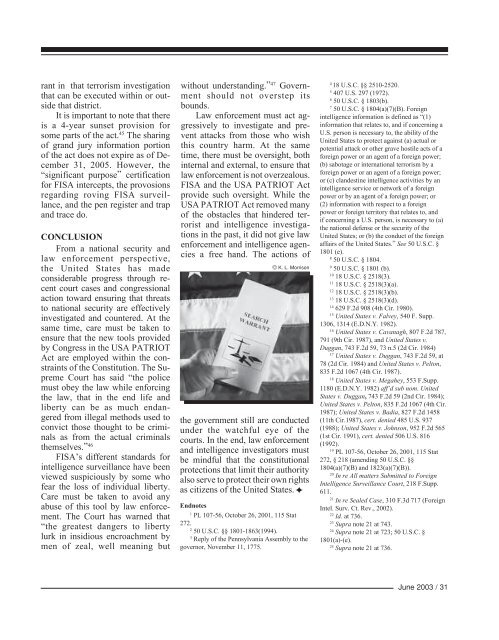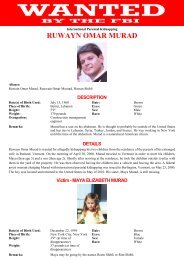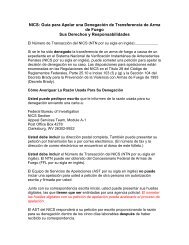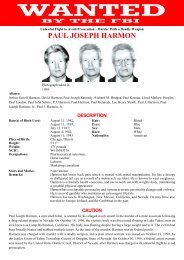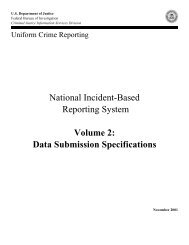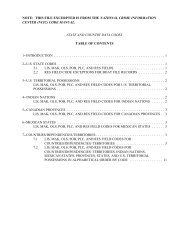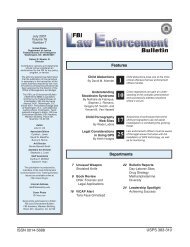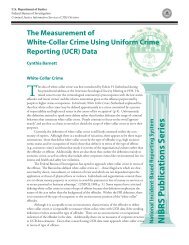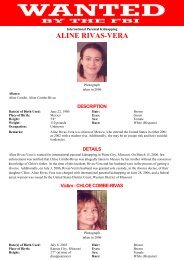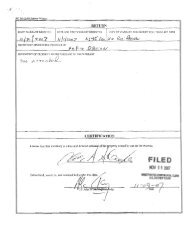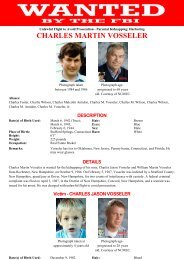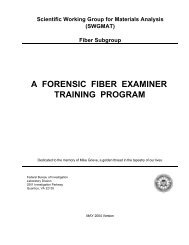F B I Law Enforcement Bulletin - June 2003 Issue
F B I Law Enforcement Bulletin - June 2003 Issue
F B I Law Enforcement Bulletin - June 2003 Issue
You also want an ePaper? Increase the reach of your titles
YUMPU automatically turns print PDFs into web optimized ePapers that Google loves.
ant in that terrorism investigation<br />
that can be executed within or outside<br />
that district.<br />
It is important to note that there<br />
is a 4-year sunset provision for<br />
some parts of the act. 45 The sharing<br />
of grand jury information portion<br />
of the act does not expire as of December<br />
31, 2005. However, the<br />
“significant purpose” certification<br />
for FISA intercepts, the provosions<br />
regarding roving FISA surveillance,<br />
and the pen register and trap<br />
and trace do.<br />
CONCLUSION<br />
From a national security and<br />
law enforcement perspective,<br />
the United States has made<br />
considerable progress through recent<br />
court cases and congressional<br />
action toward ensuring that threats<br />
to national security are effectively<br />
investigated and countered. At the<br />
same time, care must be taken to<br />
ensure that the new tools provided<br />
by Congress in the USA PATRIOT<br />
Act are employed within the constraints<br />
of the Constitution. The Supreme<br />
Court has said “the police<br />
must obey the law while enforcing<br />
the law, that in the end life and<br />
liberty can be as much endangered<br />
from illegal methods used to<br />
convict those thought to be criminals<br />
as from the actual criminals<br />
themselves.” 46<br />
FISA’s different standards for<br />
intelligence surveillance have been<br />
viewed suspiciously by some who<br />
fear the loss of individual liberty.<br />
Care must be taken to avoid any<br />
abuse of this tool by law enforcement.<br />
The Court has warned that<br />
“the greatest dangers to liberty<br />
lurk in insidious encroachment by<br />
men of zeal, well meaning but<br />
without understanding.” 47 Government<br />
should not overstep its<br />
bounds.<br />
<strong>Law</strong> enforcement must act aggressively<br />
to investigate and prevent<br />
attacks from those who wish<br />
this country harm. At the same<br />
time, there must be oversight, both<br />
internal and external, to ensure that<br />
law enforcement is not overzealous.<br />
FISA and the USA PATRIOT Act<br />
provide such oversight. While the<br />
USA PATRIOT Act removed many<br />
of the obstacles that hindered terrorist<br />
and intelligence investigations<br />
in the past, it did not give law<br />
enforcement and intelligence agencies<br />
a free hand. The actions of<br />
© K. L. Morrison<br />
the government still are conducted<br />
under the watchful eye of the<br />
courts. In the end, law enforcement<br />
and intelligence investigators must<br />
be mindful that the constitutional<br />
protections that limit their authority<br />
also serve to protect their own rights<br />
as citizens of the United States.<br />
Endnotes<br />
1 PL 107-56, October 26, 2001, 115 Stat<br />
272.<br />
2 50 U.S.C. §§ 1801-1863(1994).<br />
3 Reply of the Pennsylvania Assembly to the<br />
governor, November 11, 1775.<br />
4 18 U.S.C. §§ 2510-2520.<br />
5 407 U.S. 297 (1972).<br />
6 50 U.S.C. § 1803(b).<br />
7 50 U.S.C. § 1804(a)(7)(B). Foreign<br />
intelligence information is defined as “(1)<br />
information that relates to, and if concerning a<br />
U.S. person is necessary to, the ability of the<br />
United States to protect against (a) actual or<br />
potential attack or other grave hostile acts of a<br />
foreign power or an agent of a foreign power;<br />
(b) sabotage or international terrorism by a<br />
foreign power or an agent of a foreign power;<br />
or (c) clandestine intelligence activities by an<br />
intelligence service or network of a foreign<br />
power or by an agent of a foreign power; or<br />
(2) information with respect to a foreign<br />
power or foreign territory that relates to, and<br />
if concerning a U.S. person, is necessary to (a)<br />
the national defense or the security of the<br />
United States; or (b) the conduct of the foreign<br />
affairs of the United States.” See 50 U.S.C. §<br />
1801 (e).<br />
8 50 U.S.C. § 1804.<br />
9 50 U.S.C. § 1801 (b).<br />
10 18 U.S.C. § 2518(3).<br />
11 18 U.S.C. § 2518(3)(a).<br />
12 18 U.S.C. § 2518(3)(b).<br />
13 18 U.S.C. § 2518(3)(d).<br />
14 629 F.2d 908 (4th Cir. 1980).<br />
15 United States v. Falvey, 540 F. Supp.<br />
1306, 1314 (E.D.N.Y. 1982).<br />
16 United States v. Cavanagh, 807 F.2d 787,<br />
791 (9th Cir. 1987), and United States v.<br />
Duggan, 743 F.2d 59, 73 n.5 (2d Cir. 1984)<br />
17 United States v. Duggan, 743 F.2d 59, at<br />
78 (2d Cir. 1984) and United States v. Pelton,<br />
835 F.2d 1067 (4th Cir. 1987).<br />
18 United States v. Megahey, 553 F.Supp.<br />
1180 (E.D.N.Y. 1982) aff’d sub nom. United<br />
States v. Duggan, 743 F.2d 59 (2nd Cir. 1984);<br />
United States v. Pelton, 835 F.2d 1067 (4th Cir.<br />
1987); United States v. Badia, 827 F.2d 1458<br />
(11th Cir.1987), cert. denied 485 U.S. 937<br />
(1988); United States v. Johnson, 952 F.2d 565<br />
(1st Cir. 1991), cert. denied 506 U.S. 816<br />
(1992).<br />
19 PL 107-56, October 26, 2001, 115 Stat<br />
272, § 218 (amending 50 U.S.C. §§<br />
1804(a)(7)(B) and 1823(a)(7)(B)).<br />
20 In re All matters Submitted to Foreign<br />
Intelligence Surveillance Court, 218 F.Supp.<br />
611.<br />
21 In re Sealed Case, 310 F.3d 717 (Foreign<br />
Intel. Surv. Ct. Rev., 2002).<br />
22 Id. at 736.<br />
23 Supra note 21 at 743.<br />
24 Supra note 21 at 723; 50 U.S.C. §<br />
1801(a)-(e).<br />
25 Supra note 21 at 736.<br />
<strong>June</strong> <strong>2003</strong> / 31


